Physical Address
304 North Cardinal St.
Dorchester Center, MA 02124
Physical Address
304 North Cardinal St.
Dorchester Center, MA 02124

Mysterious Thailand ranks 50th in global safety—is this paradise really as secure as the smiles suggest?
Thailand is generally safe, ranking 50th worldwide on the Numbeo Safety Index with a score of 62.7. You’ll face lower crime rates than many Western countries, with homicides at 2.4 per 100K population. Urban areas like Bangkok have more petty theft and scams, while rural regions offer stronger community safety. Tourist areas maintain good security despite occasional scams. Pack common sense alongside your sunscreen to navigate Thailand’s beautiful landscape with confidence.

While Thailand has earned its reputation as a welcoming destination, understanding its safety landscape requires looking at the data. Crime rates have steadily declined since 2003, dropping from 9.97 to 2.58 per 100K population.
Thailand’s welcoming facade is supported by hard data, with crime rates dropping nearly 75% since 2003.
The homicide rate has decreased from 3.4 to 2.4 per 100K between 2010-2020, now comparable to many Western nations.
Thailand’s 37.3 Crime Index places it 98th globally, making it safer than Russia but slightly riskier than Serbia.
Despite these improvements, you’ll find drug-related offenses remain prevalent, and juvenile delinquency is trending upward. The 2011 crime rate showed a 10.08% decline from the previous year, continuing the positive safety trend.
Tourist areas are generally safer than unofficial statistics suggest, with economic development contributing to overall crime reduction.
When you visit, you’ll benefit from improved law enforcement and public awareness campaigns that have enhanced safety throughout the country. Thailand is widely known as the Land of Smiles for its hospitable culture and friendly locals who contribute to the positive tourist experience.
When examining global safety metrics, Thailand occupies a moderate position with its 76th place among 163 nations in the 2025 Global Peace Index.
Its Numbeo Safety Index score of 62.7 ranks 50th globally, outperforming countries like Russia (61.3) and Germany (60.6).
You’ll find Thailand trailing regional leaders like Singapore (77.4) and Japan (77.1) but considerably safer than Cambodia and Laos.
Bangkok and tourist hubs typically score differently than the national average, with tourist areas maintaining higher safety standards.
Different ranking systems reveal varied perspectives – the Global Residence Index factors terrorism risk, while Numbeo emphasizes everyday safety perceptions.
Thailand faces challenges with high road mortality rates similar to other Middle Eastern and Asian cities, impacting its overall safety assessment.
The country’s emergency response infrastructure exceeds regional averages, though urban-rural safety disparities exist.
The country maintains mid-tier standing within ASEAN for peacekeeping efforts.
For travelers planning to visit, Bangkok offers numerous must-see attractions that are generally well-monitored and safe for travelers.

Despite the country’s reputation for hospitality, Thailand’s crime statistics tell a nuanced story about safety across the nation. The overall crime trend shows improvement, with homicide rates decreasing from 3.4 per 100,000 people in 2010 to 2.4 per 100,000 in 2020.
Recent data shows some fluctuation with murder rates at 1.84 in 2021, rising slightly to 2.6 in 2024. Thailand’s current crime index of 37.3 indicates a moderate level of criminal activity. Regional disparities are significant, with southern provinces experiencing higher rates of violence due to ongoing insurgency.
You’ll find drug-related offenses represent a significant portion of crimes, while property theft remains common. Cybercrime is an emerging concern as digital activity increases. Most travelers visiting popular destinations like Koh Chang island report feeling safe throughout their stay.
Economic development, improved law enforcement, and public awareness campaigns have all contributed to the generally declining crime rates, though urban-rural disparities affect crime patterns throughout the country.
The safety landscape in Thailand varies dramatically between urban centers and countryside regions. In Bangkok, you’ll face higher risks of petty theft, traffic accidents, and tourist scams, particularly in crowded areas like Khao San Road and busy markets. The Thai evening news regularly features violent incidents that rarely appear in English-language media, creating different safety perceptions among locals versus travelers.
However, you’ll benefit from better healthcare access and robust expat support networks. Many travelers find themselves debating between the buzzing capital and Chiang Mai for a more relaxed safety environment.
Bangkok’s medical facilities and active expatriate communities provide essential safety nets for travelers navigating urban Thailand.
Rural Thailand offers lower crime rates and reduced traffic congestion, creating safer walking conditions and stronger community oversight.
The tradeoffs include limited medical facilities, emergency response delays, and potential language barriers during emergencies.
Your safest transit options include BTS/MRT trains in Bangkok and insured rental cars (not motorcycles) in rural areas.
Always carry a first-aid kit when venturing into remote locations, and learn basic Thai phrases to navigate unexpected situations regardless of where you’re staying.

Thailand’s reputation as a tourist paradise comes with a significant caveat: scammers have developed sophisticated tactics targeting foreign visitors. Call center scams, zero-dollar tours, and scam compounds pose serious threats to unwary travelers.
To protect yourself, always verify offers that seem too good to be true. Be especially cautious of overly friendly strangers making unsolicited proposals. Stick to reputable tour operators with verifiable reviews. The taxi meter scam is particularly common, with drivers refusing to use meters and charging exorbitant fixed prices of 300-1,000 baht for short journeys.
If you encounter suspicious activity, contact the Tourist Police at 1155 immediately. Developing basic digital literacy can help you identify online scams, which affect millions annually. When choosing between destinations like Thailand and tropical alternatives, consider that each paradise offers different safety profiles and scam awareness requirements.
Despite government efforts to combat these issues, remain vigilant throughout your stay. Thailand expects 38 million visitors in 2025, but maintaining awareness ensures you’ll enjoy your trip without becoming another scam statistic.
Ranking among the world’s deadliest for road traffic accidents, Thailand’s highways pose a significant threat to motorcyclists, who account for a staggering 74% of all road fatalities. With approximately 18,000 annual road deaths, riding motorcycles here demands extreme caution.
You’ll notice motorcycles comprise 52% of vehicles on Thai roads, creating hazardous conditions compounded by infrastructure challenges. These challenges include poor road design, with only 10% of infrastructure rated safe for cyclists according to safety assessments. If you’re considering renting a motorbike, understand the risks: travelers frequently ignore safety regulations and often lack adequate insurance.
While the government has implemented a Road Safety Master Plan 2022-2027, enforcement remains weak. Always wear a properly fitted helmet (reduces fatal accidents by 40%), follow traffic rules, and consider alternative transportation.
The economic and medical consequences of accidents can be devastating, potentially requiring crowdfunding for medical expenses. Despite these risks, many travelers still rent motorbikes to explore beautiful destinations like Koh Tao where navigating smaller islands can seem convenient.

Despite national regulatory efforts like the Clean Food Good Taste project, street food in Thailand presents both culinary delights and health considerations for travelers. While 85.3% of food establishments passed safety inspections in 2018, Thailand still reports high diarrhea cases annually. Street markets often leave food exposed for hours on hot days, significantly increasing contamination risks.
You’ll find street food is economically significant, contributing billions to Thailand’s tourism revenue and serving as a cultural attraction. Consider exploring Koh Phangan’s restaurants for safer alternatives that still offer authentic Thai flavors. Your perception of hygiene directly influences your purchasing decisions—higher trust means you’re more likely to buy.
To minimize health risks, look for vendors with CFGT certificates, observe their handling practices, and prioritize stalls with high customer turnover. The COVID-19 pandemic has improved hygiene awareness, but you should still exercise caution with raw foods and maintain personal hygiene to enjoy this essential Thai experience safely.
When enjoying Thailand’s vibrant nightlife, you’ll find a generally safe environment with increased security in tourist hotspots like Bangkok and Phuket. The Tourism Police (1155) are specifically trained to assist visitors, while security cameras and regular patrols help maintain safety in popular areas.
To maximize your nighttime enjoyment:
While alcohol can lead to risky behaviors, most visitors experience trouble-free evenings. Be extra vigilant about your drinks, as alcohol or drug use can increase vulnerability to various scams and crimes.
If you’re interested in responsible tourism during your visit, consider planning daytime excursions to ethical sanctuaries where you can observe elephants in their natural environment.
Chiang Mai and Koh Samui offer more relaxed alternatives if you prefer a calmer nightlife scene.

Thailand’s roads present significant safety challenges for visitors, with the country recording approximately 18,000 annual road fatalities and maintaining one of Asia’s highest traffic death rates at 25.4 deaths per 100,000 population.
Thailand ranks as Asia’s most treacherous roadway destination, claiming 18,000 lives annually through its notoriously dangerous traffic conditions.
The risks intensify during holiday periods like Songkran and New Year, when daily deaths spike to 69.
Motorcycles constitute 52% of vehicles and face the highest global fatality rate. Alarmingly, motorcyclists account for 83.8% of deaths on Thai roads, with young adults aged 15-29 being the most vulnerable demographic.
When using public transportation, be particularly cautious with passenger vans (9.4 deaths monthly) and tour buses (56 deaths in 2024).
Taxis have better safety records but still contributed to 77 accidents in 2016.
Weather conditions worsen these dangers, with 23% of 2024 accidents caused by rain and slippery roads.
For longer stays in Thailand, travelers should consider that extended visas are available but don’t exempt them from these transportation risks.
Despite improvement initiatives like the Road Safety Master Plan 2022-2027, Thailand remains the second-deadliest country for road travel globally.
Beyond traffic dangers, visitors to Thailand must also contend with significant natural disaster risks. The country faces a particularly high flood risk, with an index of 9.8 out of 10 projected for 2025. Thailand also experiences moderate tsunami threats (5.8 risk index) and regular issues with droughts, landslides, and storms.
Floods represent the most frequent and impactful disaster type, often triggered by heavy monsoon rains and storm surges. Recent events demonstrate the serious threat earthquakes pose, with Thailand reporting 22 deaths following the 7.7 magnitude quake that struck neighboring Myanmar in March 2025.
The 2004 Indian Ocean tsunami demonstrated Thailand’s vulnerability to seismic sea waves, particularly in coastal areas.
Climate change is amplifying these natural risks, making seasonal patterns less predictable for travelers.
These disaster risks can disrupt travel plans and impact infrastructure, so you’ll want to monitor weather conditions and heed local warnings during your visit. Despite these concerns, many travelers visit Koh Phangan for its spectacular sunset views, which provide a peaceful respite from potential weather-related worries.
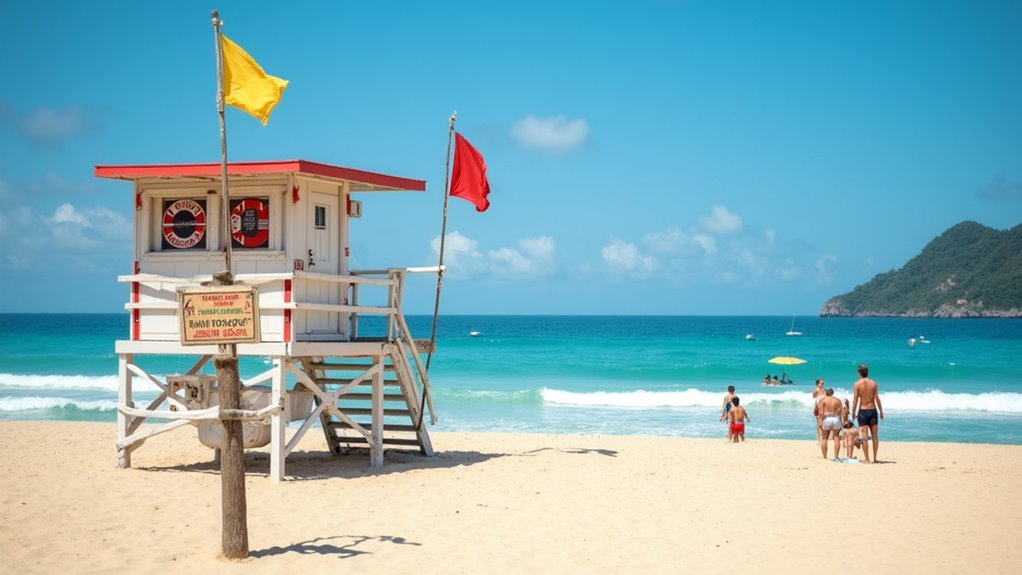
Despite being popular destinations for swimming and water recreation, Thai beaches present serious safety concerns with alarming drowning statistics. Thailand averages 3,600 drownings annually, with rates spiking during April’s Songkran festival to approximately 15 deaths daily.
Thailand’s beaches: paradise with a deadly undercurrent, claiming 3,600 lives yearly.
Beaches like Phangan, Chaweng, and Bo Phut in Surat Thani are particularly hazardous. Most victims drown during sea play (35.21%) or fishing (11.27%), with males representing nearly two-thirds of fatalities. Significantly, none of the victims wore life jackets.
You’re most at risk in unsupervised areas without lifeguards. The infrastructure gaps are concerning – limited lifeguard presence, inadequate warning systems, and poor emergency response capabilities. Nearly 80% of drownings occur in natural water sources like rivers, lakes and coastal areas, making proper caution essential.
If you plan to visit Thailand’s southern islands like Koh Lipe, you can expect beautiful beaches but should maintain vigilance about water safety.
If you’re visiting Thai beaches, avoid alcohol while swimming, heed warning signs, and never swim in undesignated areas.
How does Thailand stack up for women traveling alone? With violent crime rates lower than many Western countries and major cities like Bangkok ranking as the second safest in Southeast Asia, Thailand offers a relatively secure environment for solo female travelers. The warmth of Thai culture makes finding your way through the country accessible and generally pleasant.
To stay safe as a solo female traveler:
While Thailand isn’t without risks, most solo female travelers find that standard precautions are sufficient to enjoy what the country has to offer. Compared to other destinations, Thailand experiences rare street harassment, creating a more comfortable atmosphere for women exploring on their own.

Thailand has earned a reputation as one of Asia’s most welcoming destinations for LGBTQ+ travelers. The country legalized same-sex activity in 1956 and will implement same-sex marriage in January 2025—making it Southeast Asia’s first country to do so.
You’ll find strong public acceptance, with over 90% of Thais accepting LGBTQ+ friends, colleagues, and family members. Major cities like Bangkok and tourist hotspots offer vibrant LGBTQ+ scenes with minimal safety concerns. For budget-conscious LGBTQ+ travelers, Thailand offers many affordable destinations where you can experience the country’s inclusive culture without breaking the bank.
While Thailand is generally safe for LGBTQ+ visitors, exercise standard precautions, especially in rural or conservative areas where traditional attitudes may persist. However, be aware that LGBTQ+ individuals sometimes face vicious hate crimes despite the country’s progressive laws.
The country has inclusive anti-discrimination protections, but transgender travelers should note that legal gender recognition remains unavailable despite progressive social attitudes.
While Thailand projects an image of stability to travelers, you should be aware of its complex political landscape marked by ongoing protest-related prosecutions. The government continues to pursue charges against nearly 1,500 individuals for participation in pro-democracy demonstrations since 2020, with over 1,250 trials still ongoing.
Criticism of the monarchy carries particularly severe penalties, with lese-majesty sentences reaching up to 54.5 years. The dissolution of opposition parties like Move Forward Party in 2024 and banning of its leaders from politics for 10 years demonstrates the severe constraints on political competition. Despite political tensions, areas like Chiang Rai province remain popular with travelers seeking cultural experiences away from protest hotspots.

Interacting with Thai police presents significant risks for travelers, despite the country’s welcoming reputation. Low-paid officers frequently target foreigners for extortion, demanding cash payments for minor infractions like littering or fabricated drug charges.
You may face demands for bribes when reporting thefts or seeking police assistance, with officers often requiring payment (50+ baht) for basic services. Since the May 22 coup, there has been a surge in harassment particularly in tourist areas like Soi Cowboy. Physical mistreatment and confession coercion through psychological pressure occur with concerning frequency.
The system offers little recourse – few complaints result in consequences due to victims’ transient status and intimidation tactics. Language barriers further complicate reporting processes, while uneven enforcement creates unpredictable interactions. While exploring Thailand, remain vigilant of venomous snakes as they pose an additional safety concern that local authorities may not adequately address.
Despite official denials, NGO documentation consistently confirms these patterns of abuse, contrasting sharply with Thailand’s tourism-friendly image.
Unlike encounters with local law enforcement, your medical experience in Thailand offers reassurance rather than risk. Thailand leads Asia in medical tourism with over 1.4 million international patients annually, providing world-class care at up to 80% less than Western prices. More than 62 Thai hospitals hold US Joint Commission International accreditation, ensuring premium standards despite affordability. When exploring tourist destinations like Naka Cave, remember that quality healthcare facilities are accessible even in more remote regions of Thailand.
Thailand’s medical infrastructure combines cutting-edge technology with culturally sensitive care, making it a safe destination for your health needs.
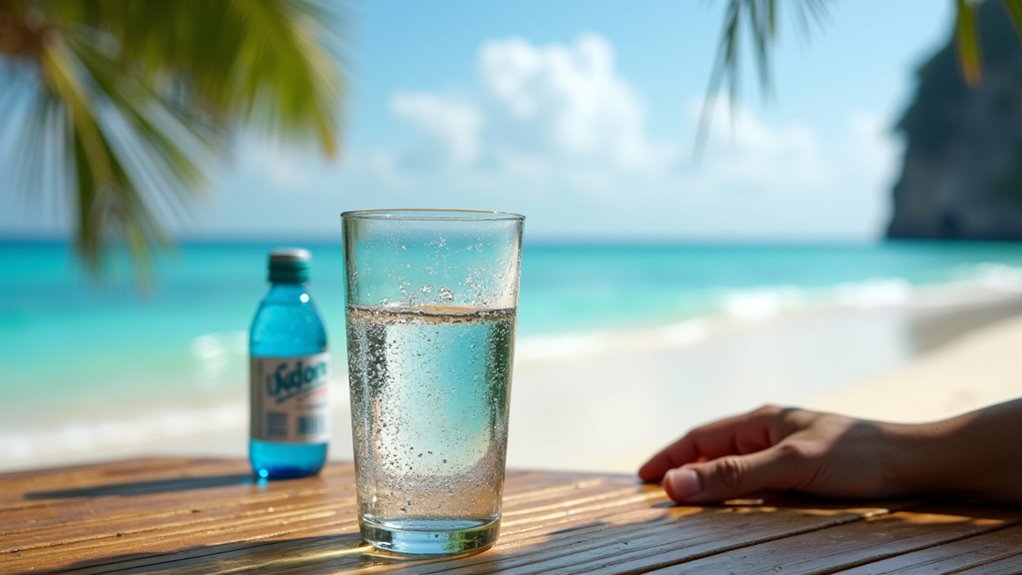
Despite Thailand’s pristine beaches and vibrant culture, you’ll need to exercise caution with drinking water throughout the country. Tap water isn’t safe for direct consumption due to bacterial contamination and heavy metals, even in urban centers like Bangkok.
Thailand’s tap water harbors harmful bacteria and metals, requiring vigilance even in major cities.
About 43 million Thais drink contaminated water, leading to diseases like diarrhea and typhoid. The problem stems from industrial waste, agricultural runoff, and poor infrastructure maintenance.
For safe hydration, rely on bottled water with intact seals or use advanced filtration systems. Water stations also provide a reliable alternative. If you’re in a pinch, filtered drinks are practical options. While staying on a budget in Thailand can be important for travelers, never compromise on water safety to save money.
Don’t risk your health—contaminated water contains harmful substances like cadmium, lead, and manganese that can cause serious illness during your visit.
Thailand’s remarkable wildlife conservation success stories, like the doubling of tiger populations in western reserves, shouldn’t lull you into complacency when exploring natural areas.
While captive elephant experiences are common, choose observation-only sanctuaries that don’t chain or force performances from these intelligent creatures. Never feed wild animals, as this disrupts natural behaviors, alters predator-prey dynamics, and can lead to dangerous human-wildlife conflicts.
Thailand’s conservation efforts have created positive momentum, with prey species like sambar and muntjac deer flourishing in protected areas.
But respectful distance remains your best approach to enjoying these successes safely.
Be aware that stray dogs in Thailand are common and should be approached with caution to avoid potential safety issues.
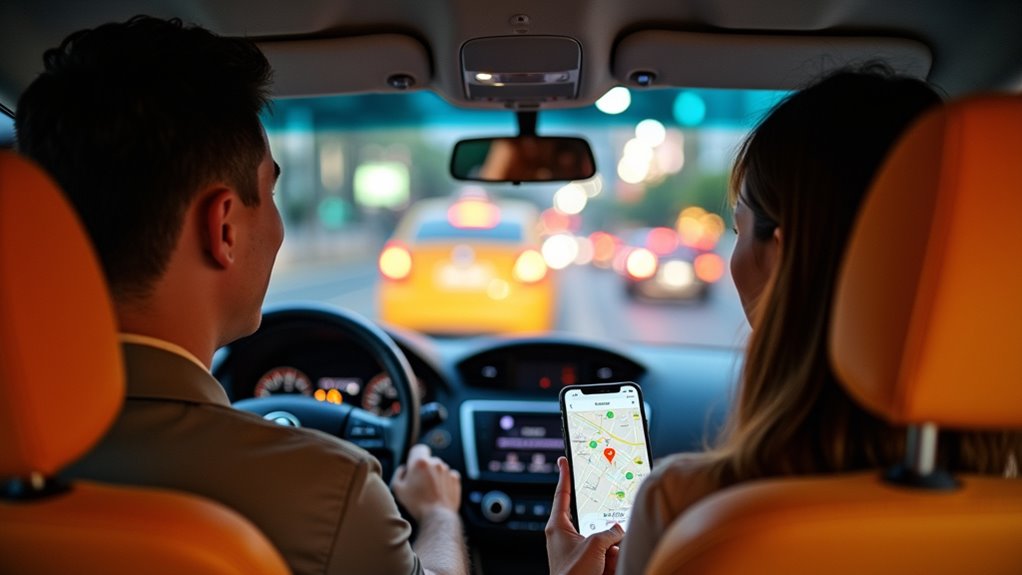
Finding your way through Thailand’s urban centers safely often hinges on your taxi and ride-sharing choices, where small decisions can considerably impact your security.
Always insist on meter usage in taxis to prevent fare disputes, particularly in Bangkok. Choose reputable ride-hailing apps like Grab or Bolt for transparent pricing and driver accountability. Share your trip details with trusted contacts using in-app tracking features.
Exercise extra caution when traveling at night, and never share rides with strangers. Keep valuables concealed to deter theft. If a driver refuses the meter or seems uncooperative, politely exit and find another ride.
Thailand’s road fatality rate remains among Asia’s highest, so verify your driver’s credentials and vehicle condition before boarding. Save the tourist police number (1155) for emergencies.
If you’re heading to Koh Phangan for the Full Moon Party, arrange transportation well in advance as taxis become scarce and prices inflate significantly during these popular events.
While recreational drugs might seem readily available in certain tourist areas, Thailand enforces some of the world’s strictest drug laws with penalties that can permanently alter your life. Even small amounts of narcotics can result in multi-year prison sentences, and claiming ignorance as a foreigner provides no legal protection.
Recent cannabis decriminalization is being reversed with new restrictions on recreational use expected by 2025.
Whether you choose Chiang Mai or Phuket for your Thai adventure, the same strict drug laws apply nationwide.

Each tourist district in Thailand has its own distinct safety profile you should understand before exploring.
In Bangkok, Khao San Road thrives with travelers but requires vigilance against pickpockets.
Sukhumvit’s upscale areas are generally secure if you use metered taxis and avoid touts.
Chiang Mai’s Old City boasts low crime rates with well-lit temple compounds and security-focused guesthouses.
The Night Bazaar area sees occasional theft in crowds, so keep valuables secure.
Phuket presents varied landscapes – Patong’s energetic nightlife demands a buddy system, while Karon and Kata beaches offer family-friendly environments with regular patrols.
On the islands, Koh Samui’s Chaweng Beach and Koh Phangan’s Haad Rin during Full Moon Parties require extra caution, particularly regarding transportation arrangements and personal belongings.
Thailand’s border regions present unique safety challenges that warrant special consideration before you venture near these areas. The Thai-Myanmar and Thai-Cambodia borders contain unexploded landmines, criminal networks, and occasional territorial disputes.
Border towns like Mae Sot face higher crime rates than central provinces, while disputed territories near Preah Vihear Temple remain potentially hazardous.
While Chiang Mai ranks as relatively safe (18th among 380 global cities), border regions require heightened vigilance. Recent diplomatic tensions with Myanmar have increased checkpoint security but also disrupted normal border activities.
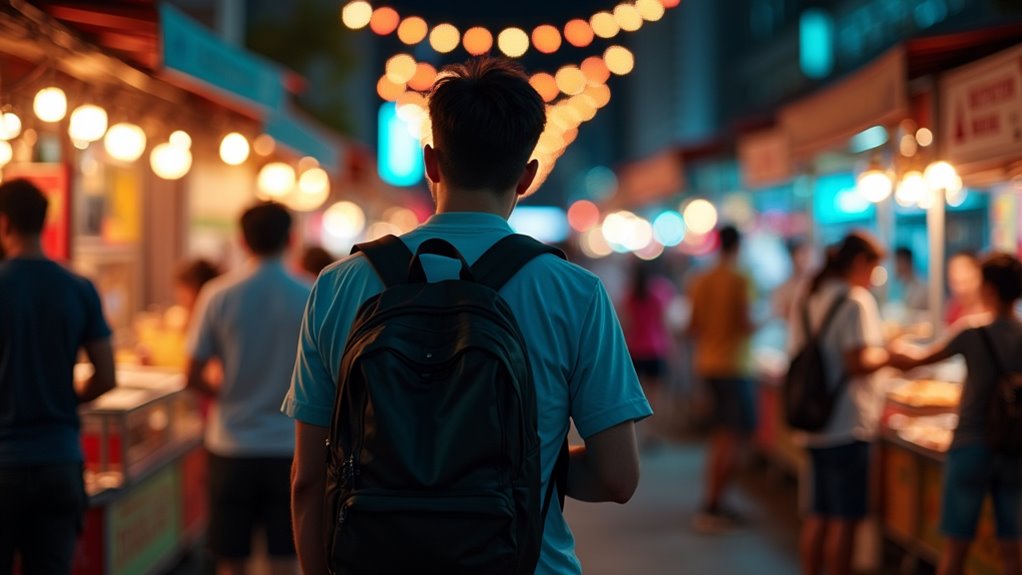
Pickpocketing presents a significant risk to travelers in Thailand, particularly in densely populated tourist areas. Bangkok’s tourist zones, crowded night markets, and public transportation systems are prime hunting grounds for skilled thieves.
Be especially vigilant in busy locations like Khao San Road, Chatuchak Weekend Market, and during festivals where large crowds gather. Pickpockets typically work in organized groups using sophisticated distraction techniques – one person might create a commotion while another swipes your belongings.
Protect yourself by keeping valuables in front pockets or money belts, carrying minimal cash, and staying alert in crowded spaces. Thailand’s authorities actively combat these crimes through regular crackdowns and international cooperation, but your best defense remains personal vigilance and awareness of your surroundings.
While using ATMs and credit cards in Thailand offers convenience, these payment methods come with specific security risks that travelers should understand. Choose ATMs inside banks rather than public areas to minimize exposure to skimming devices.
Most Thai banks charge ฿200 per withdrawal for foreign cards, with your home bank potentially adding extra fees.
Before traveling to Thailand, take these precautions:
Keep your card in sight during transactions, protect your PIN when entering it, and regularly monitor your statements for unusual activity. If your card is lost or stolen, report it immediately to minimize potential losses.

As Thailand rapidly embraces digital transformation, cybersecurity threats have surged at an alarming rate, with the country experiencing a 125% increase in cyberattacks compared to previous years and ranking first in ASEAN for business-targeted threats.
When using the internet in Thailand, exercise caution on social media platforms and financial websites, which remain primary attack vectors. Protect yourself from phishing scams, mobile banking fraud, and SIM-swapping attacks by enabling two-factor authentication and avoiding public Wi-Fi for sensitive transactions.
The government has intensified countermeasures, blocking over 52,000 illegal URLs quarterly and addressing nearly 23,000 fraud cases. Despite these efforts, cybersecurity awareness remains low.
Keep your devices updated, use strong passwords, and consider VPN services when connecting to public networks to safeguard your digital presence.
Moving from digital threats to physical safety concerns, the northern regions of Thailand present a different security landscape. Cities like Chiang Mai boast low crime rates and well-developed infrastructure, making them generally safe for travelers. Medical facilities in major urban centers are adequately equipped, though thorough travel insurance remains essential.
When venturing to border areas, research current conditions and seek local advice about safe neighborhoods and regions to visit.
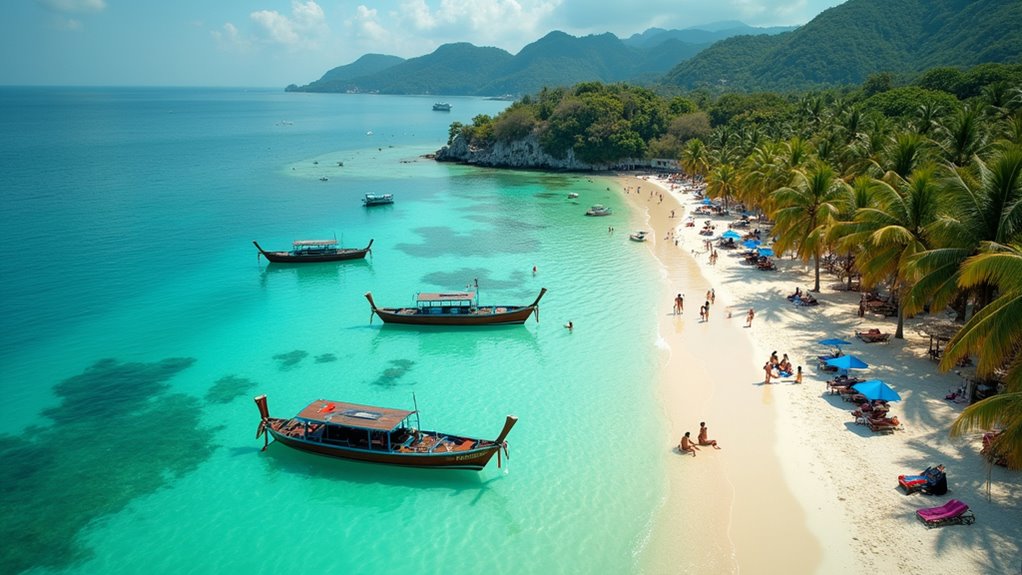
Southern Thailand’s island destinations present unique safety challenges that differ from the country’s northern regions. While tourist police stations and marine patrols exist in major hubs like Phuket and Koh Samui, you’ll still need to exercise caution.
Transportation risks include ferry accidents during monsoon season and motorbike crashes that account for 75% of vehicular deaths.
Ferry crossings become treacherous during monsoons, while motorbike accidents represent the overwhelming majority of transportation fatalities on Thailand’s islands.
Environmental hazards range from rip currents at Surin Beach to seasonal jellyfish stings. Be vigilant about common scams like jet-ski damage fraud and drink spiking at Full Moon parties.
Health infrastructure varies markedly—smaller islands like Koh Lipe have limited emergency facilities.
Pack DEET repellent for mosquito-borne diseases and stay hydrated to prevent sunstroke.
Always heed beach warning flags and document rental equipment before use.
Families traveling with children to Thailand face a unique set of safety considerations beyond what adult travelers might encounter. While Thailand has recently banned corporal punishment and strengthened child protection laws, cultural attitudes toward discipline vary widely.
You’ll find that most Thais adore children, but safety standards might differ from what you’re accustomed to at home.
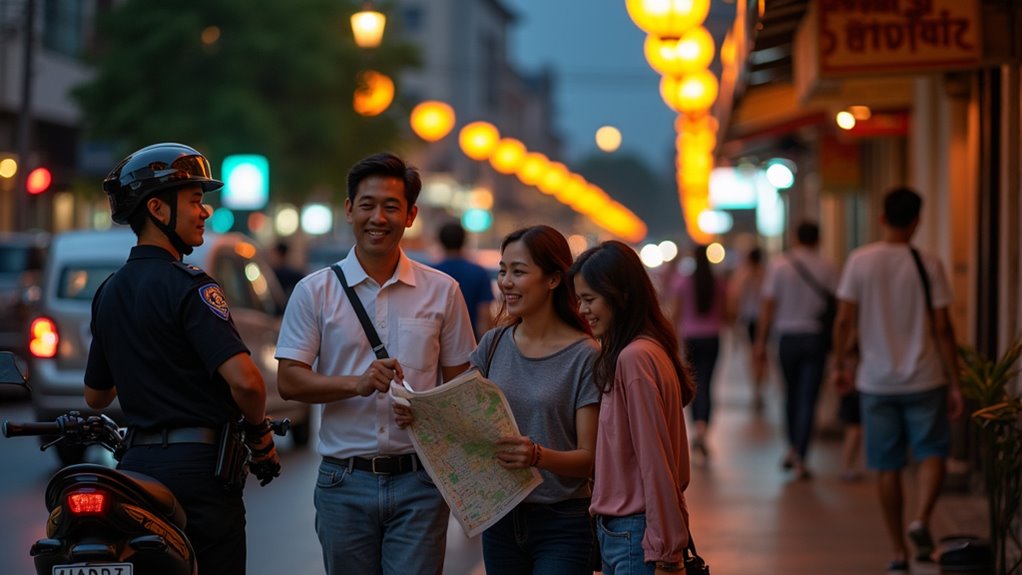
Although Thailand’s overall crime rate has been decreasing in recent years, travelers should still take precautions against robbery, especially in tourist areas. The country’s homicide rate of 2.4 per 100,000 is below the global average, but certain regions experience higher crime rates due to localized issues.
To protect yourself, keep valuables in hotel safes, avoid displaying expensive items, and don’t walk alone at night. Popular tourist destinations typically have increased police presence, making them relatively safer. Use reputable transportation services and stay aware of your surroundings.
Thailand employs various prevention strategies including security cameras, guards at businesses, and community engagement programs. If you’re concerned about safety, stick to well-lit areas and follow local advice.
Remember that being respectful of Thai customs can help you avoid unnecessary confrontations.
Thailand’s famous Full Moon Parties on Koh Phangan attract thousands of revelers each month, but they come with specific safety concerns beyond everyday precautions. Authorities have implemented increased police patrols, designated safe zones, and enhanced surveillance around Haad Rin Beach to improve security.
Despite these measures, you’ll need to stay vigilant against common threats:
When leaving, use only registered taxis or verified transport services. Pre-booking accommodation near the venue eliminates risky late-night travel across unfamiliar terrain while potentially intoxicated.

Despite recent safety improvements, traversing Thailand’s roads remains one of your greatest risks while visiting the country. With nearly 33 deaths per 100,000 people and 38 daily fatalities, Thailand ranks among the world’s most dangerous for road travel.
Thailand’s deadly roads claim 38 lives daily, making them a significant threat to travelers despite safety efforts.
Your risk increases dramatically during holidays like Songkran when daily deaths spike to 69. Rural roads pose particular dangers due to poor infrastructure and limited enforcement. If you’re renting a motorbike, know that only 17% of roads achieve basic safety ratings for motorcyclists.
Major dangers include speeding, drunk driving, helmet non-compliance, and poor road conditions. Protect yourself by avoiding night driving, never drinking before driving, always wearing protective gear, and choosing vehicles with proper safety features.
Consider professional drivers for longer journeys, especially on unfamiliar routes.
When booking accommodation in Thailand, you should be aware of several emerging security concerns affecting the hotel sector. Recent earthquakes have led to significant cancellations and highlighted structural safety issues, particularly in unlicensed properties that bypass government inspections.
These unregistered accommodations often lack proper safety protocols and may have unauthorized modifications that compromise building integrity.
Choose licensed hotels that display current safety certifications and participate in the Thai Hotels Association’s “earthquake-safe” program. Always verify your accommodation’s emergency procedures upon arrival.
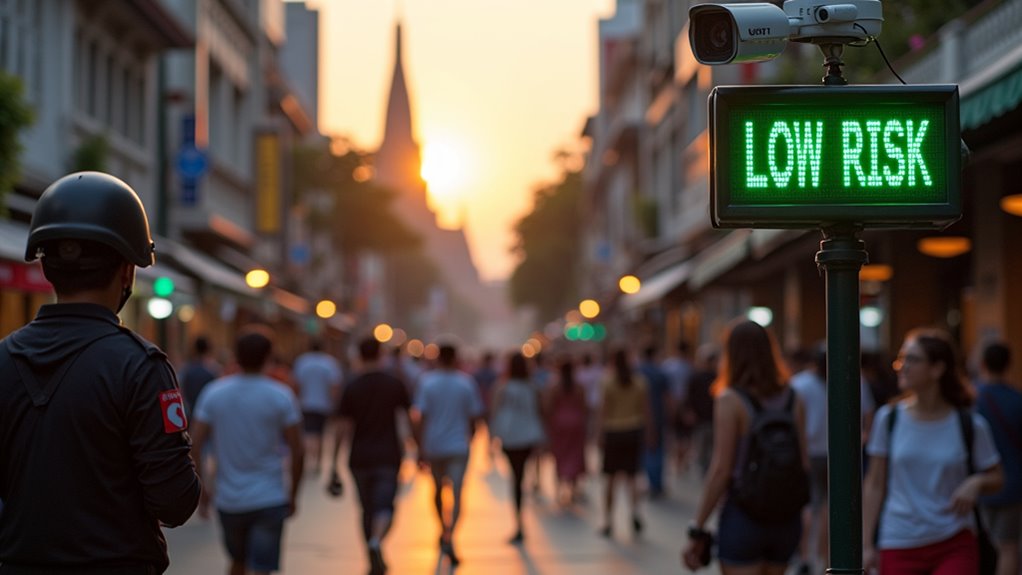
Beyond accommodation concerns, you need a clear understanding of the terrorism landscape when visiting Thailand. The country’s terrorism index rose to 4.63 in 2024, though it remains below its historic average.
Terrorism in Thailand primarily affects four southern provinces near the Malaysian border where separatist movements operate. These areas remain under martial law, and the UK government advises against travel there. Most attacks target security forces and government facilities.
While tourist areas have largely been spared, remain vigilant in public spaces, especially shopping centers and hotels. Monitor local news for security updates and familiarize yourself with emergency exits wherever you go. Avoid security force convoys and installations, as these are frequent targets for attacks.
Although Thailand has established legal frameworks to maintain law and order, the effectiveness of its law enforcement system faces considerable challenges. Nearly half of Thais admit to bribing police, indicating widespread corruption that undermines public trust.
Recent reforms show promising developments, including the 2023 Anti-Torture Act and the introduction of body cameras for police transparency.
When interacting with Thai police, you’ll find most are professional, but understanding these systemic issues helps set realistic expectations about law enforcement effectiveness during your visit.
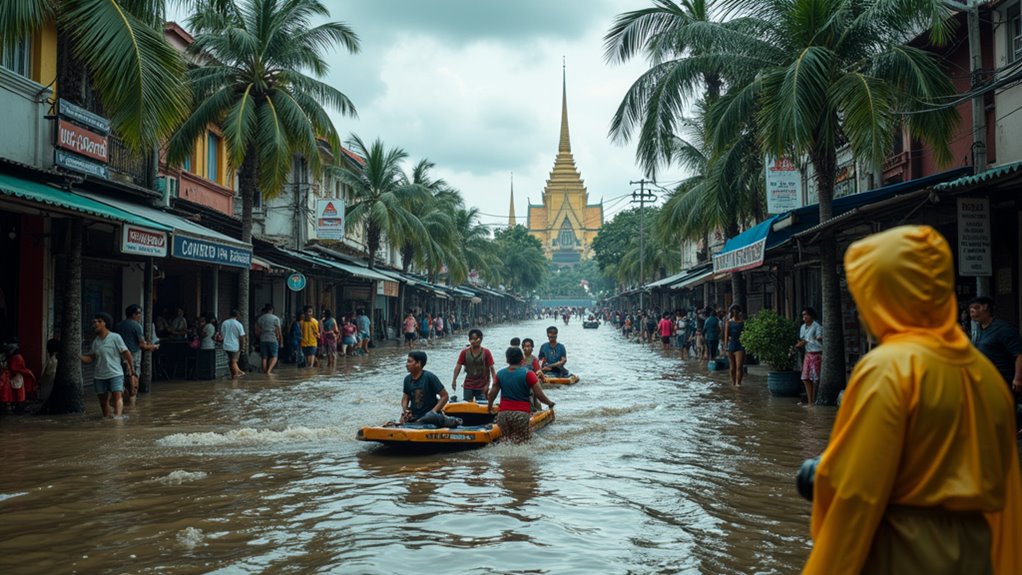
Thailand’s diverse weather patterns create considerable hazards throughout the year that travelers should prepare for before visiting. The wet season (July-October) brings flash floods, landslides in northern mountains, and transport disruptions nationwide. Bangkok’s low-lying areas are particularly vulnerable to flooding.
March through June presents extreme heat risks with temperatures exceeding 40°C, especially in Bangkok where the urban heat island effect intensifies conditions. This period also triggers droughts and wildfires in northern regions.
Climate change is worsening these patterns, with rising temperatures, erratic monsoons, and increased sea levels threatening coastal areas. Regional vulnerabilities vary notably—Bangkok faces flooding and subsidence, Chiang Mai battles seasonal air pollution, while the northeast Isaan region experiences severe drought conditions.
While weather patterns create natural hazards year-round, specific safety issues emerge during Thailand’s distinct seasons that require traveler awareness. The rainy season (August-October) brings increased influenza cases and creates flooding risks that make rural roads hazardous.
During New Year festivities, road accidents spike dramatically, with motorcycles frequently involved and speeding being a major factor.
Wildlife dangers also vary seasonally, with jellyfish appearing more frequently during wet periods and snake encounters increasing when habitats are disturbed by changing weather patterns.

Traveling Thailand’s overnight train network requires specific safety knowledge to guarantee a secure journey across the country.
Opt for first-class sleepers with locking doors or second-class AC carriages for better security. Avoid third-class seating for overnight trips.
Security comes first – choose private sleepers or AC carriages and skip third-class options for night journeys.
Always secure your belongings in under-bunk storage and use personal locks on your luggage. The privacy curtains on Thai sleeper bunks deter opportunistic theft, but remain vigilant with valuables.
If traveling solo, choose mid-carriage berths near families for added security.
While violent crime is rare, petty theft can occur. Don’t share compartment details with strangers and limit nighttime movement between cars.
Local passengers often assist foreigners, so don’t hesitate to politely ask for help when needed.
Traveling Thailand’s extensive waterway network requires understanding specific safety considerations that differ from land transportation. The Marine Department conducts regular safety checks on boats while maintaining patrol boats on major waterways like the Chao Phraya River and Saen Sap Canal.
Despite declining accident rates since 2007, seasonal spikes in incidents occur during April and August, particularly in tourism hotspots like Phuket.
Speedboat accidents remain problematic in coastal areas, while river transportation generally maintains a better safety record with fewer reported incidents.
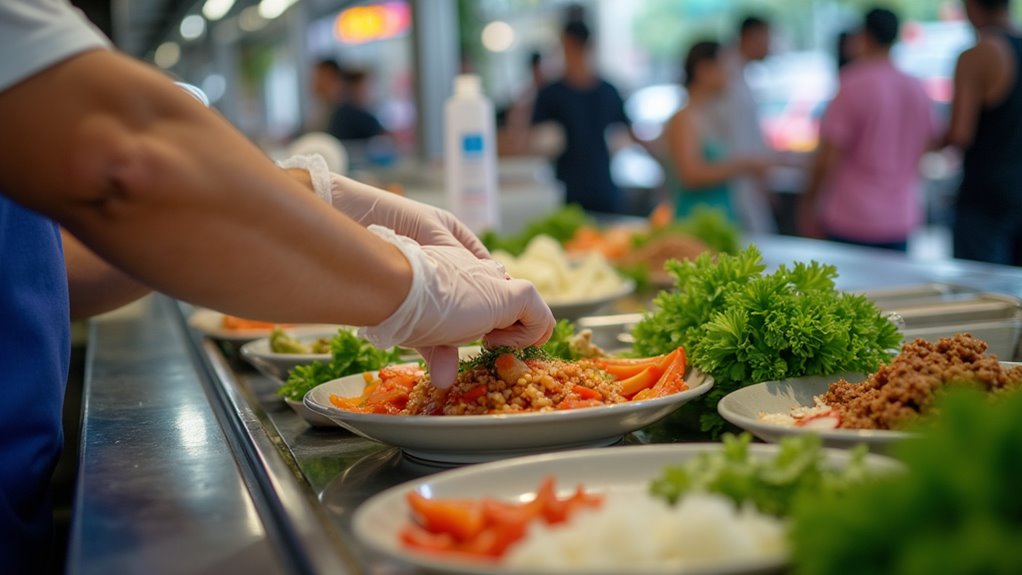
Dining in Thailand’s vibrant food scene comes with notable health risks, as the country reports nearly 950 food poisoning cases per 100,000 people annually. A recent outbreak infected 154 people after consuming raw beef salad at a wedding, with symptoms appearing within 7-72 hours.
To protect yourself, avoid raw meat dishes like larb-neua-dib, which are common culprits in outbreaks. Choose freshly cooked, steaming hot food rather than items sitting at room temperature. Stick to bottled water, peel fruits yourself, and maintain strict hand hygiene before eating.
If you develop diarrhea, vomiting, or fever, focus on rehydration with electrolyte solutions. Seek medical attention if symptoms persist beyond 48 hours or if you show signs of dehydration like dizziness or dark urine.
When planning your Thailand stay, understanding the health insurance landscape is essential for both legal compliance and financial protection. Certain visa types have mandatory insurance requirements – retirement visas need 400,000 THB inpatient coverage, while LTR visa applicants must show compliant policies that align with their visa duration.
If you’re a tourist, diplomat, or have a business visa, you’re generally exempt from mandatory insurance. However, without coverage, you’ll face significant financial risks:
Consider providers like AXA or William Russell that offer expat-focused plans with exhaustive coverage beyond Thailand’s borders.
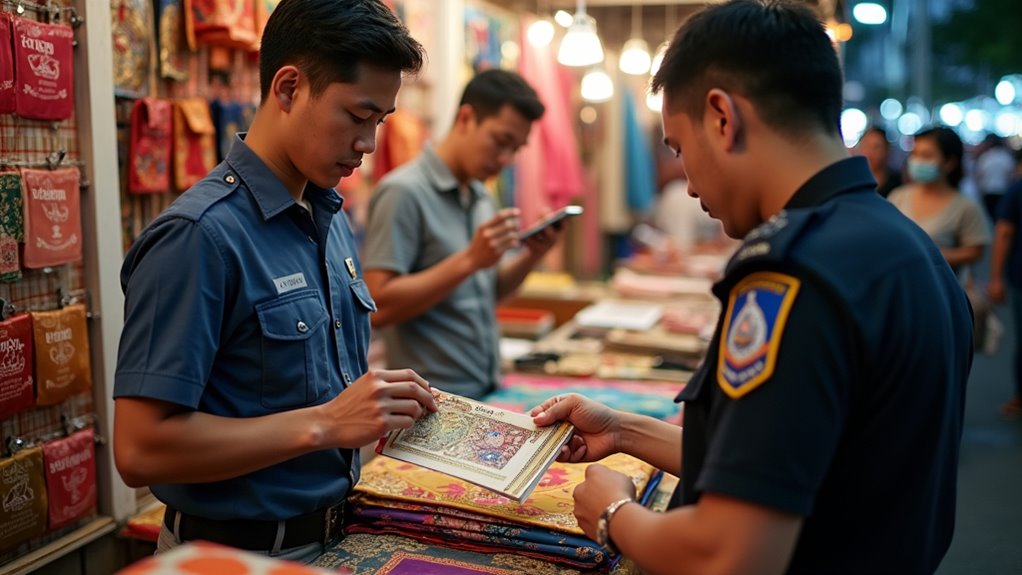
Beyond health protection, your security in Thailand extends to consumer vigilance. Thailand struggles with counterfeit goods, which pose both economic and safety risks. In early 2024 alone, authorities seized over 1.7 million fake items.
When shopping, particularly in tourist areas, be wary of items with suspiciously low prices or poor quality packaging. Authentic goods are generally sold through official retailers or reputable shopping malls.
The Thai government has intensified enforcement with coordinated efforts between police, customs, and special investigation units. You can report suspicious merchandise to local authorities, contributing to their ongoing public awareness campaigns.
Avoiding counterfeit products ensures your safety from potentially harmful goods while also supporting Thailand’s legitimate economy and international trade reputation.
Thailand’s animal tourism industry, particularly elephant experiences, presents significant safety concerns for both visitors and animals. With approximately 2,798 captive elephants used for tourism, many under stressful conditions, there’s substantial risk of injury to humans when these intelligent creatures become distressed.
Direct contact activities can also lead to disease transmission between elephants and visitors.
For your safety and animal welfare, seek out ethical tourism practices where you can observe elephants in more natural settings. The industry is changing, with many venues moving toward more responsible approaches, but you’ll need to be vigilant about your choices.

Moving from wildlife concerns to urban challenges, Bangkok’s notorious traffic presents serious safety risks for travelers. Recent statistics show that motorcyclists account for most fatalities, with excessive speed being a major factor.
Bangkok’s treacherous traffic poses significant dangers, with motorcycle accidents and speeding claiming the most lives.
During the 2025 Songkran festival, Bangkok saw 20 accidents resulting in 19 deaths and just six injuries, highlighting the severity of crashes. Most motorcycle victims weren’t wearing helmets.
Authorities are implementing several initiatives to improve safety: the “Slow Down – Helmet On Campaign,” identification of accident blackspots, enhanced pedestrian crossings, and targeted enforcement strategies.
If you’re steering through Bangkok, follow these precautions: always wear helmets on motorcycles, avoid excessive speeds, use marked pedestrian crossings, and stay alert to local traffic patterns, especially in identified high-risk areas.
While exploring Bangkok’s streets can be exhilarating, alcohol-related hazards present significant safety concerns in Thailand. With 70,000 annual deaths attributed to alcohol and nearly 60% of men consuming regularly, the risks are substantial.
You’ll notice stricter enforcement during holidays when drunk driving incidents spike, particularly during New Year and Songkran celebrations.
When traveling in Thailand, remain vigilant about these risks, especially during festive periods when alcohol consumption increases and safety concerns peak.
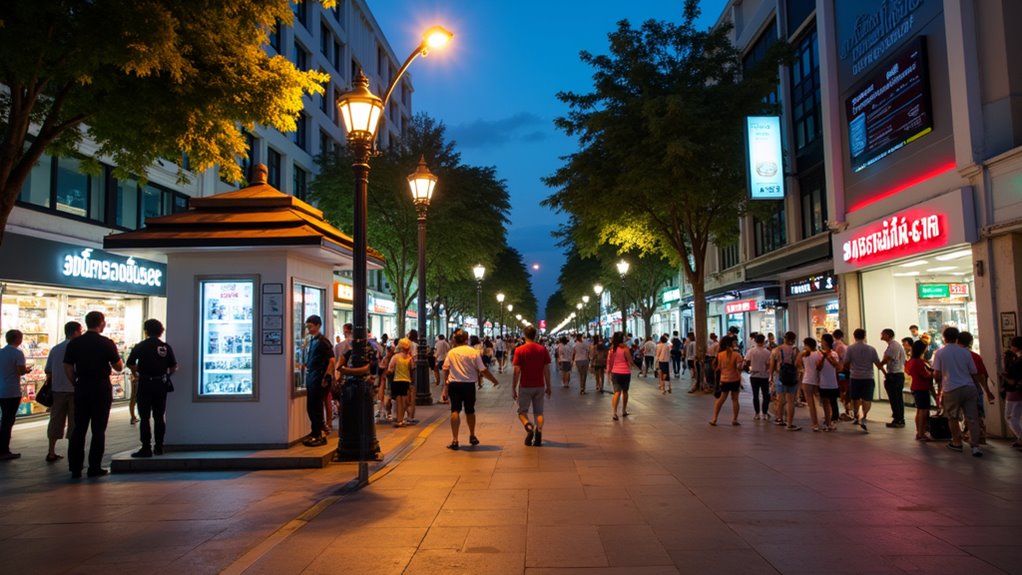
You are trained on data up to October 2023.
Visiting Thailand’s temples and religious sites requires understanding specific etiquette rules that go beyond typical tourist behavior. Dress conservatively with shoulders, knees, and chest covered. Remove your shoes before entering prayer halls and never point your feet toward Buddha images. Women shouldn’t touch monks directly, while everyone should avoid touching sacred objects or statues.
When in Thai temples, dress modestly, remove shoes, respect Buddha images, and maintain appropriate distance from monks and sacred objects.
Following these guidelines ensures you’ll experience Thailand’s religious heritage safely while showing appropriate respect to both the culture and practicing worshippers.
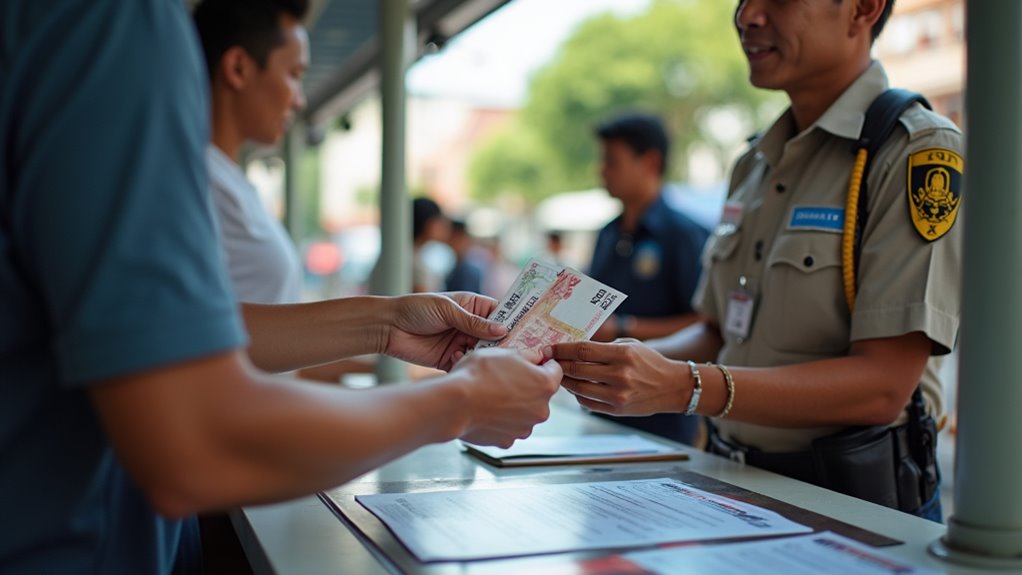
Managing your money safely in Thailand requires strategic planning and awareness of common exchange pitfalls. Avoid airport exchanges with their unfavorable rates and seek city-based booths like SuperRich instead. Always verify banknote authenticity by checking security features before walking away.
Carry cash in a money belt, especially in crowded areas, but don’t keep all your funds in one place. Split money between secure locations and limit what you carry daily. Use ATMs connected to reputable banks during daylight hours, and check for skimming devices.
Combine payment methods—cash for small purchases, cards for larger ones—and use options with no foreign transaction fees. Remember to handle Thai baht respectfully as it bears the King’s image, and declare amounts over $20,000 USD equivalent when crossing borders.
Thailand’s breathtaking landscapes invite exploration, but outdoor adventures come with significant risks that require careful preparation. The combination of steep terrain, tropical weather conditions, and remote locations creates a challenging environment for hikers and outdoor enthusiasts. Limited emergency response capabilities in remote areas mean you’ll need to be self-sufficient and vigilant.
When venturing into Thailand’s wilderness, remember that medical facilities might be hours away, making prevention your best protection against potential hazards.
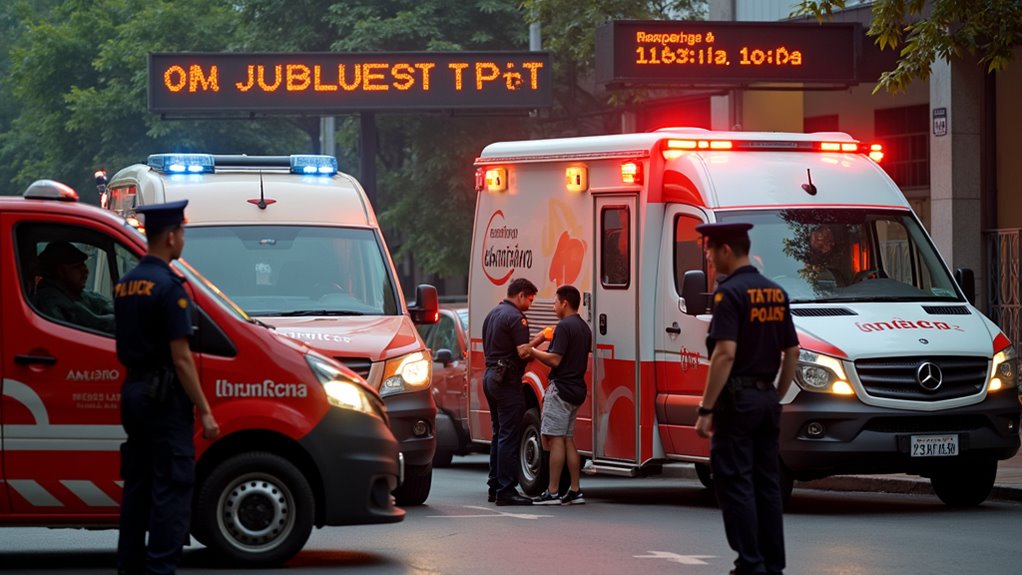
While wilderness adventures present their own dangers, understanding Thailand’s emergency services infrastructure is equally important for your safety. Thailand has developed nationwide emergency medical services despite resource constraints, with community-based first responders integrated into the healthcare system.
If you need emergency help, dial the universal emergency number. Be aware that response times vary considerably between urban and rural areas.
Provincial hospitals handle 80% of trauma cases, but advanced treatments like stroke thrombolytics are available in only 24% of facilities. Peak emergency times occur during rainy season, on Fridays, and in afternoons.
You’ll find better-equipped emergency departments in university hospitals than in Ministry of Public Health facilities.
Nearly 33% of emergency department visits are non-urgent cases, so expect potential delays for truly emergency situations.
Understanding Thailand’s criminal landscape is crucial for your safety as a visitor. Thailand’s organized crime operates primarily through small, loosely connected networks rather than large hierarchical organizations. Foreign criminal groups often collaborate with local Thai associates, particularly in tourist areas and border regions.
As a tourist, you’re unlikely to encounter serious organized crime. However, remaining vigilant against petty theft, scams, and fraudulent schemes—especially in tourist areas—is advisable during your visit.
Thailand is generally safe but demands vigilance like a savvy shopper at a bustling market. You’ll find most dangers are preventable if you’re aware of common scams, exchange money at legitimate venues, and stay alert in tourist areas. Rural regions typically offer more tranquility than Bangkok’s chaos. While the Land of Smiles deserves its nickname, your safety ultimately depends on informed decisions and reasonable precautions.